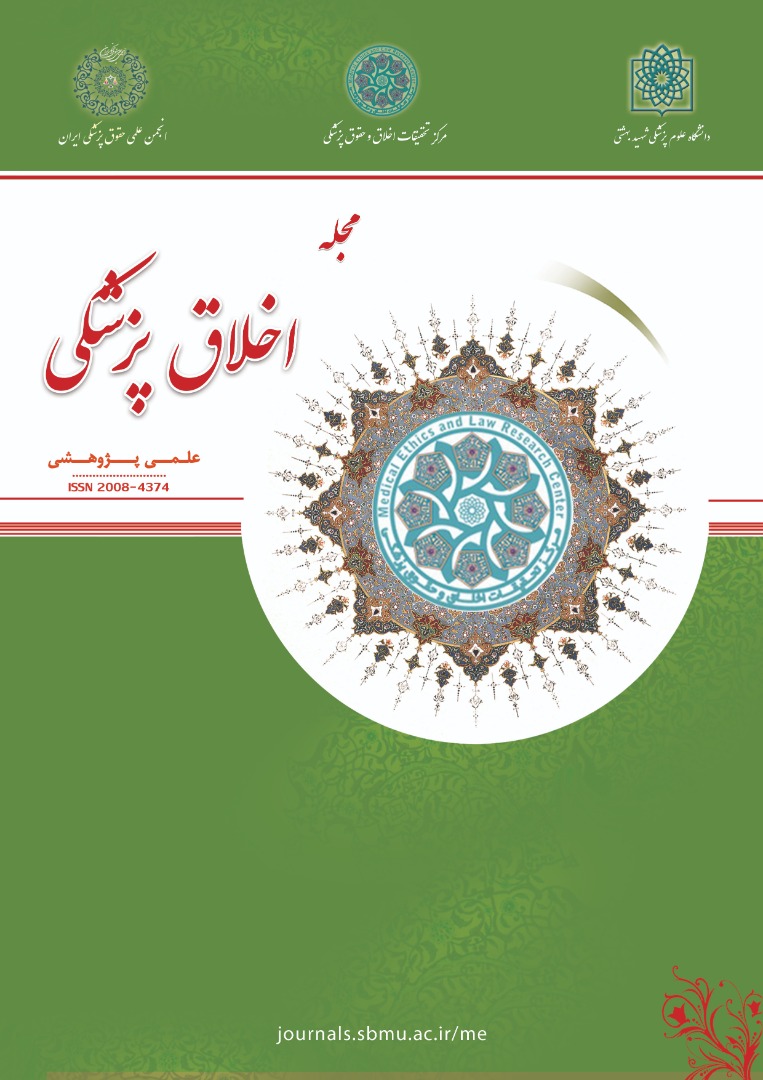معنویت و تعالی معرفتی و رفتاری در نظام آموزش عالی
مجله اخلاق پزشکی - علمی پژوهشی,
دوره 7 شماره 26 (1392),
14 اردیبهشت 2014
,
صفحه 115-134
https://doi.org/10.22037/mej.v7i26.5366
چکیده
آموزش نیروی انسانی کارآمد و مؤثر، بر پایه یک نظام دارای ساختار محکم و مبانی عالی تربیتی ممکن خواهد بود. ضرورت تعالی معرفتی و رفتاری نیروی انسانی، دغدغه اصلی مدیران آموزشی در برنامههای تعالی سازمانی است. شناخت عوامل ارتقای معرفتی و رفتاری امری ضروریست. معنویت به عنوان عامل تکمیلکننده و معنادهنده بخشهای گوناگون زندگی انسان میباشد. با توجه به اهمیت معنویت و تعالی معرفتی و رفتاری در آموزش عالی، لذا در این پژوهش با مرور متون به روشی نظام مند برای آگاهی از جدیدترین اطلاعات در مورد مفهوم معنویت و تعالی معرفتی و رفتاری در نظام آموزش عالی پرداختهایم. نتایج نشان میدهد که معنویت سبب بروز ویژگیهایی در انسان میشودکه در تعالی او به خصوص در آموزش تأثیر به سزایی دارد. برنامهریزی آموزشی مبتنی بر معنویت در جهت تعالی معرفتی و رفتاری نیروی انسانی امری ضروری است.
- معنویت؛ تعالی رفتاری و معرفتی؛ آموزش عالی؛ برنامهریزی آموزشی
ارجاع به مقاله
مراجع
Ashmos, D. Duchon, D. (2000). Spirituality at work: A conceptualization and measure. Journal of Management Inquiry. 9 (2): 134-45.
Bagheri, KH. (2008). Look back to Islamic education.
Bateman, TS. Scott, SA. (2002). Management: competing in the new era.
Biswajeet, P. (2006). Human Resource Management.
Bouckaert, L. (2003). Spirituality as a public affair. Ethical Perspectives. 10 (2): 106-9.
Carson, VB. (2000). Mental Health Nursing.
Fry, L. (2003). Toward a theory of spiritual leadership. Leadership Quarterly. 14: 693-727.
Fry, L. (2005). Spiritual leadership and army transformation: Theory, measurement, and establishing a baseline. Leadership Quarterly. 16: 835-862.
Halama, P. Strizenec, M. (2004). Spiritual, existential or both? Theoretical considerations on the nature of higher intelligences. Studia Psychologica. 43: 239-53.
Hassan, M. Zafar Yaqub, M. (2010). Strategic role of human resource development as boundary spanner. European Journal of economics- finance and administrative . 19.
Hawks, SR. Hull, M. Thalman, RL. Richins, PM. (1995). Review of spiritual health: definition, role, and intervention strategies in health promotion. American Journal of Health Promotion. 9 (5): 371-8.
Hoover, D. (2007). How “Whole” is Whole person learning? An examination of spirituality in experimental learning. Developments in Business Simulation and Experiential Learning. 34: 90-85.
Leikas, J. (2009). Life-Based Design A holistic approach to designing human-technology interaction. Edita Prima Oy, Helsinki 2009. VTT Technical Research Centre of Finland. JULKAISIJA – UTGIVARE – PUBLISHER.
Marashi, SM. (1995). In search of competence and educational roles of teachers. Proceedings of the 4th conference on teacher education.
Midgley, M. ( 2002). Science as Salvation: A Modern Myth and its Meaning. British Library Cataloguing in Publication Data. 4-25.
Mu’tazili, IAA. (2009). Nahj-al- balaghe description. 20: 319.
Myers, JE. Sweenery, TJ. Witmer, JM. (2000). The wheel of Wellness counseling for illness: a holistic model for treatment planning. Journal of counseling and development. 78 (3): 251-66.
Narayanasamy, A. (1999). ASSET: a model for auctioning spirituality and spiritual care education and training in nursing. Nurse Education. 19: 274-85.
Parsaykta, Z. (2006). Comments about the clinical competencies of nursing students and their achievement level. Nursing Research. 1 (3): 14-7.
Rabie, E. Abdel-Halim and Khaled M. AlKattan. (2012). Introducing medical humanities in the medical curriculum in Saudi Arabia: A pedagogical experiment. Urol Ann. 4 (2): 73-9.
Raoof, A. (1992). Teacher training and apprenticeship.
Rippentrop, AE. Altmaier, EM. Burns, CP. (2006). The relationship of religiosity and spirituality to quality of life among cancer patients. Journal of Clinical Psychology in Medical Settings. 13 (1): 31-7.
Ross, LW. (1995). The spiritual dimension: its importance to patients' health, well-being and quality of life and its implications for nursing practice. Institute Journal for Nursing Studies. 32: 457-68.
Sisk, D. (2008). Engaging the spiritual intelligence of gifted students to build global awareness in the classroom. Academic research library. 30 (1): 24-30.
Tong, LF. Han, YB. (2005). Applying TQM philosophy to the teaching and learning process, Monash University, Malaysia.
- چکیده مشاهده شده: 530 بار
- PDF (English) دانلود شده: 189 بار
